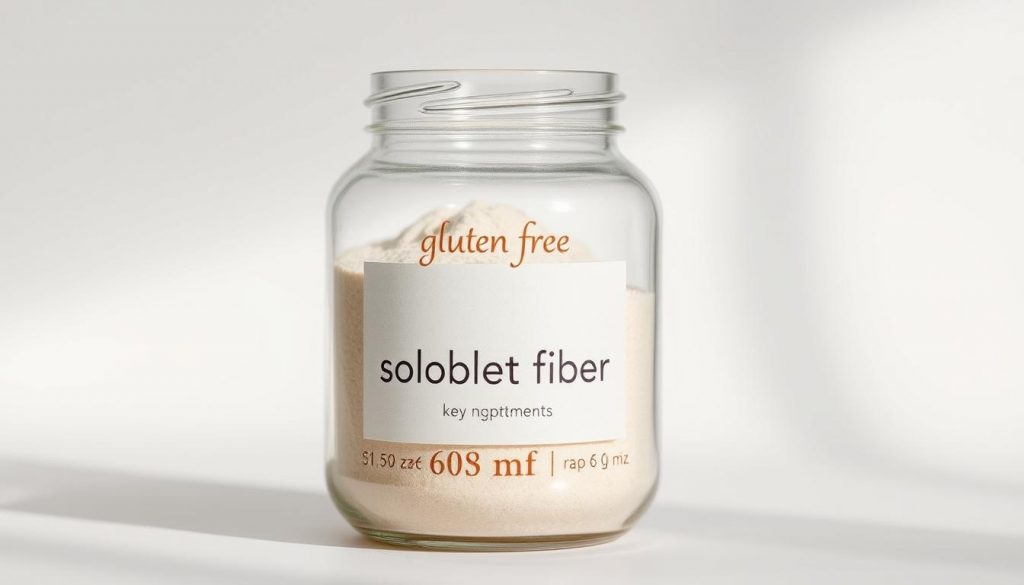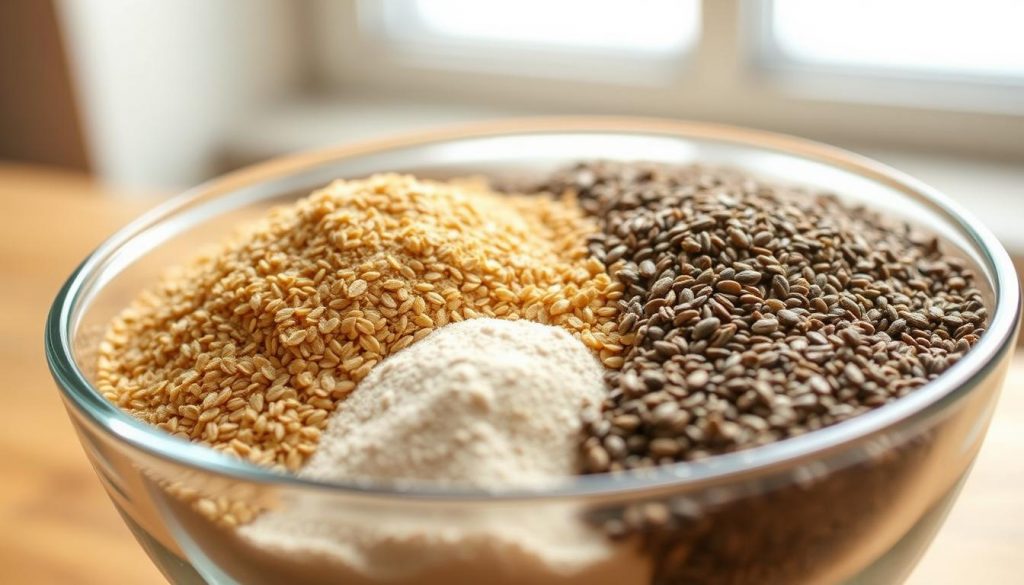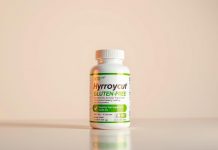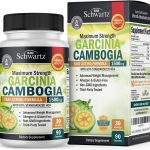Are you having trouble getting enough fiber on a gluten-free diet? Many people with celiac disease or gluten intolerance face this issue. This is because gluten-free foods often lack fiber1. The average American only gets about 17 grams of fiber a day, which is less than half the recommended amount1. So, a fiber supplement is key to your daily routine.
With so many choices, picking the right fiber supplement can be tough. But, a gluten-free fiber supplement can help you reach your fiber goals.
Table of Contents
Key Takeaways
- You may need a fiber supplement for gluten free diet if you’re struggling to get enough fiber in your daily meals.
- Adult men should consume about 38 grams of fiber daily, while adult women should consume about 26 grams of fiber daily1.
- A gluten free fiber supplement can help you meet your daily fiber goals and support overall health.
- Many gluten-free fiber supplements are recommended, including Nutrisource Fiber or Sun Fiber, which contains guar gum1.
- When choosing a fiber supplement, consider a gluten free fiber supplement that is low FODMAP certified, like Tomorrow’s Nutrition Sunfiber2.
- Always consult with a healthcare provider before starting any new supplement, including a fiber supplement for gluten free diet.
Understanding Fiber and Its Benefits
Adding high fiber gluten free supplements to your diet is a smart move. It’s key to know how fiber boosts your health3. A diet full of fiber can cut down colorectal cancer risk by 22% and type 2 diabetes risk by 30-40%3. It also lowers heart disease risk by 15-30%3.
Choosing the right fiber supplements is important. Look for both soluble and insoluble fiber. Soluble fiber can lower total cholesterol by 5-10%3. Insoluble fiber helps keep your bowels regular. Women need 25 grams of fiber daily, and men need 38 grams4.
Legumes like lentils are packed with fiber, up to 15.5 grams per cup3. Chia seeds offer about 10 grams of fiber per 2 tablespoons3. Adding these foods and supplements to your diet can help you reach your fiber goals and support your health.
- Lowers the risk of colorectal cancer by 22%3
- Reduces the risk of developing type 2 diabetes by 30-40%3
- Decreases the risk of heart disease by 15-30%3
- Helps promote bowel regularity
By adding high fiber gluten free supplements to your diet, you’re taking a big step towards better health4.
Why Gluten-Free Diets Need Fiber
Following a gluten-free diet means you need to watch your fiber intake. Many gluten-free foods have less fiber5. A natural fiber supplement for gluten free can fill this gap. The daily fiber needs vary by age and gender, from 19 grams to 38 grams for men, and 19 grams to 26 grams for women6.
To boost your fiber, add whole grains like quinoa, buckwheat, and amaranth to your meals. You can also use gluten free digestive fiber supplements for better digestion. Here are some high-fiber foods to add to your diet:
- 1 cup of cooked lentils: 16 grams of fiber6
- 1 medium pear with skin: 6 grams of fiber6
- 1 ounce of gluten-free oat bran: 12 grams of fiber6
Choose a natural fiber supplement for gluten free diet that fits your needs. Always talk to a healthcare provider before starting any new supplements5.
Types of Fiber Supplements
There are many gluten free fiber supplements to choose from. You can pick gluten free fiber pills or go for whole foods like chia seeds and flaxseeds7. shows that 97% of Americans don’t get enough fiber, making supplements a good choice. Look for a supplement with at least 6 grams of soluble fiber to help with constipation and diarrhea7.
Inulin is another prebiotic fiber that’s good for your gut. Supplements like Tomorrow’s Nutrition Sunfiber can help control blood sugar and reduce spikes after meals, which is great for people with diabetes or insulin resistance7. When picking a supplement, check the fiber amount per serving and any extra ingredients or certifications, like low FODMAP8.
It’s important to find a supplement that fits your diet and preferences. For example, Metamucil has 6 grams of fiber in 2 teaspoons, with 5 grams being soluble8. Benefiber, on the other hand, has 3 grams of soluble dietary fiber in 2 teaspoons8. Always talk to a healthcare provider before starting any new supplement, even more so if you have special dietary needs or restrictions.
Whole foods like chia seeds and flaxseeds are also great sources of fiber9. says flaxseed meal has 33.5 grams of fiber per cup, which is a lot. When adding fiber supplements to your diet, start slow and drink plenty of water to avoid any discomfort7.
| Supplement | Fiber Content | Certifications |
|---|---|---|
| Metamucil | 6 grams per 2 teaspoons | Gluten-free |
| Benefiber | 3 grams per 2 teaspoons | Gluten-free |
| Tomorrow’s Nutrition Sunfiber | 6 grams per serving | Low FODMAP |
Key Nutrients to Look for in Fiber Supplements
When picking a fiber supplement for a gluten-free diet, look at the key nutrients it offers. A gluten free soluble fiber supplement can lower heart disease, type 2 diabetes, and some cancer risks10. Also, it should have vitamins and minerals to meet your dietary needs.
Some fiber supplements have added sugars, artificial flavors, or fillers, which are bad for you. It’s important to pick a supplement with few ingredients and no artificial stuff11. says 97% of Americans don’t get enough fiber, so a supplement is key for a gluten-free diet.
When checking out fiber supplements, find ones with good micro and macro nutrients, like GOBIOTIX Fiber Supplement11. A good supplement should also be easy on your stomach. Tomorrow’s Nutrition Sunfiber Prebiotic Fiber Supplement has 6 grams of soluble fiber per serving11.

To get the most from your fiber supplement, think about these key nutrients:
- Vitamins: Look for supplements with vitamins C and D.
- Minerals: Choose supplements with calcium and iron.
- Soluble fiber: Opt for supplements with soluble fiber sources like psyllium husk or chia seeds.
By focusing on these nutrients and picking a quality fiber supplement, you can boost your health and well-being on a gluten-free diet.
How to Choose the Right Fiber Supplement
Choosing the right fiber supplement is key. You should think about what you need and what you like. A healthcare provider can help you find the best fiber supplement for gluten free diets. About 16 out of 100 U.S. adults have constipation, and a gluten-free fiber supplement can help.
Here are some things to consider when picking a fiber supplement:
- Get advice from a healthcare provider on the right fiber for you12.
- Check labels to make sure it’s gluten-free and from a trusted source13.
- Think about what you prefer and any allergies you have, like gluten14.
The daily fiber goal is 25-30 grams, with 28 grams for a 2,000-calorie diet12. By picking the right gluten-free fiber supplement, you can meet this goal. This helps keep your digestive system healthy.
Always put your health first and talk to a healthcare provider before starting any new supplement. This is true for gluten-free fiber supplements14.
| Fiber Supplement | Fiber Content |
|---|---|
| Metamucil | 6 g per 2 rounded Tbsp |
| Benefiber | 3 g per 2 tsp |
Mixing Fiber Supplements into Your Diet
Adding high fiber gluten free supplements to your meals can be fun. Try adding chia seeds to smoothies or use whole grain flours for baking9. This boosts fiber and adds texture and taste.
Top fiber supplements for a gluten free diet are easy to mix into recipes. For instance, add psyllium husk to gluten-free flour for more fiber8. Or, use inulin or chia seeds as prebiotic fiber to aid digestion9.
Here are some tips for adding fiber supplements to your meals:
- Add chia seeds to your smoothies or oatmeal for an extra fiber boost9
- Use whole grain flours, such as brown rice or quinoa, for baking9
- Mix psyllium husk into your gluten-free flour for added fiber8
Always talk to a healthcare provider before starting new supplements, if you have health issues8. For more on gluten-free diet pills and weight management, visit this website.

| Fiber Supplement | Fiber Content per Serving |
|---|---|
| Metamucil | 6 grams |
| Benefiber | 3 grams |
| Chia Seeds | 5 grams |
By adding high fiber gluten free supplements to your diet, you support your digestive health and overall well-being15. Always pick certified gluten-free supplements and follow the dosage guidelines.
Tips for Introducing Fiber Supplements
When you start using gluten free digestive fiber supplements, begin with a small amount. This helps your body get used to it without feeling uncomfortable16. Slowly increase the dose over a few days.
Drinking plenty of water is key. It makes fiber move smoothly through your digestive system16. Try to drink at least 8 ounces of water with each fiber supplement16.
Eating a balanced diet with whole foods can help with side effects17. Women should aim for 25 grams of fiber daily, while men should aim for 38 grams17. Foods like ground flaxseed and chia seeds are great sources of fiber.
Increasing fiber intake can improve your health. It can lower bad cholesterol and keep blood sugar stable18. Fiber also helps with weight loss by making you feel full18. For best results, take your supplements regularly and pair them with natural fiber sources18.
| Fiber Source | Fiber Content |
|---|---|
| Ground Flaxseed (1 tablespoon) | 2.8 grams |
| Chia Seeds (1 tablespoon) | 4.9 grams |
| Gluten-Free Fiber Supplement (1 serving) | varies |
Popular Brands of Fiber Supplements
Choosing a good gluten free fiber supplement can be tough. There are many brands like Metamucil and Benefiber that offer gluten free options. These brands help support your digestive health. Research shows picking a reputable brand is key. Adults need about 25-30 grams of fiber daily, but many don’t get enough19.
Metamucil and Benefiber are well-known for their quality. Vitalicious offers natural, whole-food-based options. When picking a supplement, look at the ingredients and benefits. For example, Tomorrow’s Nutrition Sunfiber gives 6 grams of fiber per serving19. Yerba Prima Psyllium Husks Veg Caps have 25% more fiber than others19.
Always read labels and talk to a healthcare provider before trying new supplements. This ensures you get the right amount of fiber for your health. With many choices, you can find a supplement that fits your needs. The average American gets about 15 g of fiber, showing the need for supplements20.
It’s also important to look at serving sizes and prices. For example, Metamucil has 3 g fiber per serving20. Bellway Super Fiber costs $29.99 for 50 servings, about $0.60 each20. By considering these factors, you can pick the best supplement for you. Start slowly and drink plenty of water when adding a new supplement to avoid discomfort21.
Common Myths About Fiber Supplements
When looking at gluten free soluble fiber supplements, it’s key to know what’s real and what’s not. Many think fiber supplements are just for those with digestive problems. But, they can actually help anyone who wants to eat more fiber.
Some myths say fiber supplements are only for those with gluten issues. But, studies show a high-fiber diet can lower heart disease risk22. They also aid in weight control and improve digestion23.
Here are some common myths about fiber supplements:
- Fiber supplements are only for people with digestive issues
- Fiber supplements are not necessary for a gluten-free diet
- Fiber supplements can cause bloating and discomfort
Always talk to a doctor before starting any new supplement, like a gluten free soluble fiber supplement24. They can guide you on what’s best for your health and ensure you get all the nutrients you need.
In conclusion, fiber supplements are great for a gluten-free diet. They offer important nutrients and boost health and well-being22. By knowing the truth about fiber supplements, you can make smart choices for your health and find the right gluten free soluble fiber supplement for you23.
| Myth | Reality |
|---|---|
| Fiber supplements are only for people with digestive issues | Fiber supplements can be beneficial for anyone looking to increase their fiber intake |
| Fiber supplements are not necessary for a gluten-free diet | A fiber supplement for gluten free diet can help promote digestive health and provide essential nutrients |
| Fiber supplements can cause bloating and discomfort | While some people may experience bloating or discomfort when starting a new fiber supplement, this can often be mitigated by gradually increasing the dosage |
Potential Side Effects of Fiber Supplements
When looking for a best fiber supplement for gluten free diet, knowing the side effects is key. Fiber supplements can boost your fiber intake but might cause bloating, gas, and stomach pain25. Some people might also have allergic reactions to certain fiber supplements26.
To avoid these issues, pick a gluten free fiber supplement from quality sources. Start with a small dose and slowly increase it. Common side effects include:
- Abdominal bloating and gas
- Diarrhea or constipation
- Abdominal pain or cramping
A best fiber supplement for gluten free diet can also ease gluten intolerance symptoms like stomach pain and bloating26. But, if side effects are severe or last long, talk to a doctor.
In summary, fiber supplements are great for a gluten-free diet but knowing the side effects is important. Choose a top-notch gluten free fiber supplement and follow the dosage. This way, you can support your health and well-being25.
| Age Group | Recommended Daily Fiber Intake |
|---|---|
| 19-30 years | 34 grams (males), 28 grams (females) |
| 31-50 years | 31 grams (males), 25 grams (females) |
| 51 and over | 28 grams (males), 22 grams (females) |
When to Seek Professional Advice
Fiber supplements can be great for a gluten-free diet. But knowing when to ask for help is key. If you’re dealing with bloating, constipation, or diarrhea, you might need more fiber9. Also, if you’re finding it hard to get 25-35 grams of fiber daily, or your child’s age plus 5 grams, talk to a dietitian9.
A dietitian can create a fiber plan just for you. They consider your diet, health, and gluten-free needs. They also help with side effects like gas or bloating from new fiber sources27. Getting professional advice ensures you get the right fiber for your health.
FAQ
What is the importance of fiber supplements for individuals on a gluten-free diet?
What are the different types of fiber supplements available?
What key nutrients should I look for in a fiber supplement?
How do I choose the right fiber supplement for my gluten-free diet?
How can I incorporate fiber supplements into my daily meals?
What are some common myths and misconceptions about fiber supplements for gluten-free diets?
What are the possible side effects of fiber supplements, and when should I seek professional advice?
Source Links
- Best Top Dietitian-Approved Gluten-Free Fiber Supplements – https://delectablefoodlife.com/best-top-dietitian-approved-gluten-free-fiber-supplements/
- The 9 Best Fiber Supplements of 2025 That Are Expert Recommended – https://www.everydayhealth.com/nutritional-supplements/best-fiber-supplements/
- Fiber Supplements Explained: Types, Benefits, and Risks – https://www.rupahealth.com/post/fiber-supplements-explained-types-uses-and-considerations
- What Happens to Your Body When You Take a Fiber Supplement – https://www.eatingwell.com/benefits-of-fiber-supplements-8420645
- The Gluten-Free Diet: Fad or Necessity? – https://pmc.ncbi.nlm.nih.gov/articles/PMC5439366/
- Eating Fiber to Manage Constipation While on a Gluten-Free Diet – https://www.massgeneral.org/children/down-syndrome/eating-fiber-to-manage-constipation-while-on-a-glutenfree-diet
- Girlboss – https://girlboss.com/a/blog/best-gluten-free-fiber-supplement?srsltid=AfmBOorSaoqpCymYoyh6MErbsNMlfQYmjP1j4QFKEcozMNNB_FJT01yQ
- 7 Fiber Supplements That May Be OK If You’re Gluten-Free – https://www.verywellfit.com/gluten-free-fiber-supplements-562295
- Gluten-Free Ways to Eat More Fiber – https://www.massgeneral.org/children/celiac-disease/glutenfree-ways-to-eat-more-fiber
- The Essential Guide to Gluten-Free Fiber Supplements – https://www.geneticnutrition.in/blogs/genetic-life/the-essential-guide-to-gluten-free-fiber-supplements?srsltid=AfmBOoqTswZfGQougexPXJEgtHT-80jZwpvU3nqyHEOONdFGIuKccczz
- Girlboss – https://girlboss.com/a/blog/best-gluten-free-fiber-supplement?srsltid=AfmBOoq7xk1PwGzKFANAWgvTARo1FSATUcqUXdZZSOvCjjDxV_DDiCSB
- What is the Best Fiber Supplement for Women? How to Choose | Season – https://www.seasonhealth.com/blog/best-fiber-supplement-for-women
- The Golden Rules of a High Fiber Diet – https://www.med.umich.edu/1libr/MBCP/HighFiberDietAdults.pdf
- How Do You Choose the Best Fiber Supplement? – https://health.clevelandclinic.org/best-fiber-supplements
- How Add More Dietary Fibre Into Your Gluten Free Diet – PART 2 Food Online Australia – https://www.gfnation.com.au/blogs/learning/how-add-more-dietary-fibre-into-your-gluten-free-diet?srsltid=AfmBOoqHCSU-6kKyRbmze1g8Dcb7JlaCSAgiRZ8EvIHR34n2E5ifsV-H
- Best way to take fiber supplements – Konsyl Pharmaceuticals – https://konsyl.com/best-way-to-take-fiber-supplement/?srsltid=AfmBOooZiOAnxCg7z-jdy1WZ9gzypHgzE0mDHFojrUXUdHr3l8hDgGws
- Gluten-Free Fiber Supplements – Tayler Silfverduk – https://tayler.silfverduk.us/gluten-free-fiber-supplements/
- So, You Want to Increase your Fiber Intake? – https://www.umassmed.edu/nutrition/blog/blog-posts/2022/3/so-you-want-to-increase-your-fiber-intake/
- Girlboss – https://girlboss.com/a/blog/best-gluten-free-fiber-supplement?srsltid=AfmBOooA_bb3Lnqkg4ae8-GCVdq_JcXoicUR6xEMvrgeJLgbw2J7OesV
- 8 best fiber supplements for constipation and health – https://www.medicalnewstoday.com/articles/best-fiber-supplements
- The Best Fiber Supplements, According to Registered Dietitians – https://www.glamour.com/story/best-fiber-supplements
- Fiber supplements and clinically proven health benefits: How to recognize and recommend an effective fiber therapy – https://pmc.ncbi.nlm.nih.gov/articles/PMC5413815/
- Fiber Myths Many People Still Believe | Imperial Digestive Health Specialists PLLC – https://idhsmedical.com/fiber-myths-many-people-still-believe/
- Gluten: Myths and Facts – Feed Your Potential – https://www.fyp365.com/gluten-myths-and-facts/
- How Much Fiber Is Too Much? Effects, Treatment, and More – https://www.healthline.com/health/food-nutrition/too-much-fiber
- Gluten-Free Diets: Are There Negative Side Effects? – https://www.verywellfit.com/gluten-free-diet-side-effects-562712
- Gluten-free diet for ulcerative colitis: Benefits and risks – https://www.medicalnewstoday.com/articles/ulcerative-colitis-gluten-free-diet












